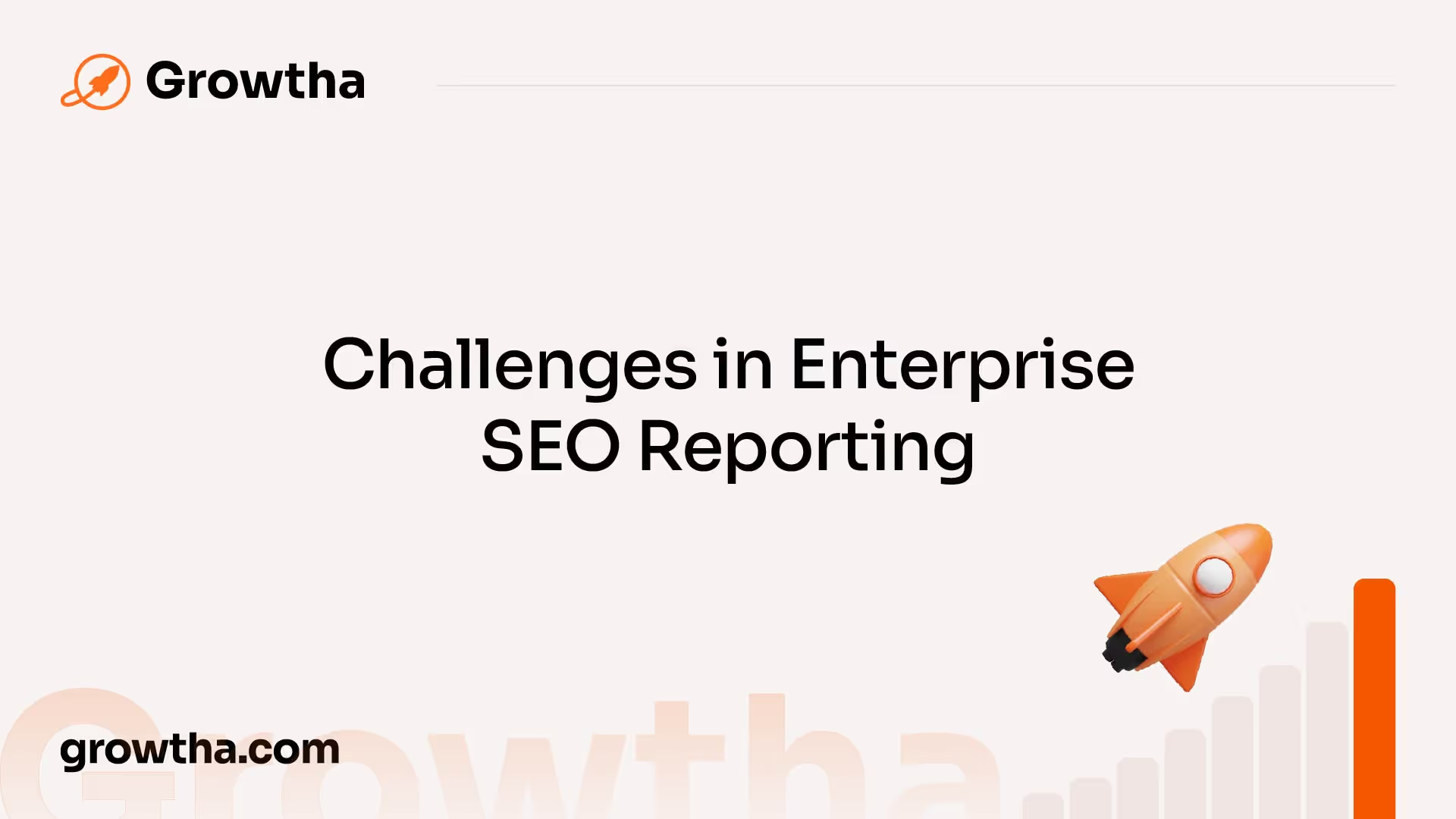Enterprise SEO Metrics & Reporting Techniques
When it comes to enterprise SEO, understanding and tracking key metrics is essential for measuring success and making data-driven decisions.


Enterprise SEO Metrics & Reporting Techniques
Understanding Enterprise SEO Metrics

When it comes to enterprise SEO, understanding and tracking key metrics is essential for measuring success and making data-driven decisions. In this section, we will explore three important metrics: organic traffic, conversion rate, and organic revenue.
Key Metrics for SEO Success
To gauge the effectiveness of SEO efforts, it's crucial to monitor key metrics that indicate success. These metrics provide insights into the performance of your website and its visibility in search engine results. By tracking these metrics over time, you can assess the impact of your SEO strategies and make informed optimizations.
Impact of Organic Traffic
Organic traffic plays a pivotal role in SEO success. It reflects the number of visitors who find your website through organic search engine results. Monitoring organic traffic to the entire site and specific pages is essential for assessing performance [1].
By analyzing organic traffic data, you can identify trends, spot potential issues, and measure the effectiveness of your SEO campaigns. Increasing organic traffic indicates that your website is attracting more visitors and gaining visibility in search engines, contributing to improved brand awareness and potential conversions.
Importance of Conversion Rate

Conversion rate is a critical metric that measures the percentage of visitors who take a desired action on your website. Whether it's making a purchase, filling out a form, or downloading a resource, tracking conversion rate provides valuable insights into the effectiveness of your website in converting visitors into customers or leads.
To calculate conversion rate, divide the total number of conversions by the total number of visitors and multiply by 100. The specific actions considered as conversions may vary based on your goals, such as downloads for campaigns or purchases for e-commerce sites.
A high conversion rate indicates that your website is effectively engaging and persuading visitors to take the desired actions. By analyzing conversion rate data, you can identify areas for improvement, optimize your website's user experience, and refine your SEO strategies to enhance conversions.
Tracking Organic Revenue
In enterprise SEO, tracking organic revenue is crucial for understanding the financial impact of your SEO efforts. Organic revenue measures the amount of money spent by visitors who found your website through organic search. It provides valuable insights into the effectiveness of different campaigns and channels on revenue generation.
Monitoring organic revenue alongside other SEO elements allows you to assess the return on investment (ROI) of your SEO activities. It helps you understand the revenue generated from organic search and evaluate the effectiveness of your SEO strategies in driving conversions and revenue.
By measuring organic revenue, you can identify the most profitable keywords, prioritize resources effectively, and optimize your SEO campaigns to maximize revenue generation.
Understanding and tracking these key metrics is crucial for assessing the effectiveness of your enterprise SEO efforts. By regularly monitoring organic traffic, conversion rate, and organic revenue, you can gain valuable insights into the performance of your website and make data-driven decisions to drive SEO success.
Reporting and Analytics in Enterprise SEO

When it comes to enterprise SEO, reporting and analytics play a crucial role in assessing the effectiveness of SEO strategies and measuring success. In this section, we will explore three important metrics to track and analyze: organic revenue, SEO return on investment (ROI), and search visibility metrics.
Tracking Organic Revenue
Tracking organic revenue helps measure the financial impact of organic search visitors on a website. It provides insights into the effectiveness of different campaigns and channels in generating revenue. By monitoring organic revenue alongside other SEO elements, businesses can gauge their progress and make data-driven decisions.
To track organic revenue, it is essential to integrate analytics tools, such as Google Analytics, that provide detailed reports on revenue generated from organic traffic. By analyzing the revenue data, businesses can identify trends, optimize conversion paths, and attribute revenue to specific SEO strategies or campaigns.
Analyzing SEO ROI
SEO return on investment (ROI) measures the effectiveness of the investment in SEO activities by comparing it to the revenue generated [1]. Calculating SEO ROI helps businesses understand the value they are getting from their SEO spending and justifies increased marketing investments.
To calculate SEO ROI, businesses need to track the costs associated with SEO efforts, including content creation, link building, technical optimizations, and SEO tools. These costs should be compared to the revenue generated from organic search traffic. A higher SEO ROI indicates a more effective SEO strategy and can guide businesses in allocating resources more efficiently.
Search Visibility Metrics
Search visibility metrics are vital for measuring how prominently a website appears in search results. These metrics include the number of keyword rankings, keyword positions, and impressions [1]. Tracking search visibility metrics helps businesses optimize their content, identify technical issues, and monitor their overall performance in search engines.
Keyword rankings provide insights into how well a website is positioned for targeted keywords. Monitoring keyword positions allows businesses to track improvements or declines in rankings over time. Impressions indicate how often a website appears in search results, giving an indication of its visibility to potential visitors.
By regularly monitoring search visibility metrics, businesses can identify areas for improvement, optimize content to target relevant keywords, and address any technical issues that may hinder their search visibility.
Tracking and analyzing these metrics in enterprise SEO reporting enables businesses to evaluate the effectiveness of their SEO strategies, make data-driven decisions, and continuously improve their online presence. By leveraging the right SEO tools and regularly auditing and monitoring their performance, businesses can optimize their keyword performance, identify areas for improvement, and achieve long-term success in the competitive digital landscape.
Challenges in Enterprise SEO Reporting

When it comes to enterprise SEO reporting, there are specific challenges that marketers face due to the complexity and scale of operations. Two significant challenges include data accuracy and consistency, as well as handling large data volume.
Data Accuracy and Consistency
Enterprise SEO reporting involves collecting data from various sources, teams, and departments. This complexity can lead to inaccuracies and inconsistencies in data collection or reporting. Clear communication between teams is essential to ensure that data is accurately and consistently collected and reported.
To address this challenge, it's crucial to establish standardized data collection and reporting processes across the organization. This includes implementing clear guidelines and protocols for data collection, data validation, and reporting. Regular audits and quality checks can help identify and rectify any discrepancies or issues in data accuracy and consistency.
Handling Large Data Volume
Enterprise SEO involves dealing with a large volume of data, which can sometimes overwhelm the reporting process. With numerous metrics to track and analyze, it's important not to overlook critical insights and areas for improvement due to data overload.
To effectively handle large data volume, it's essential to streamline data collection and analysis. This can be achieved by utilizing automated tools that consolidate and organize data in a centralized manner. These tools can help marketers focus on key metrics and provide actionable insights without getting overwhelmed by the sheer volume of data.
There are several SEO reporting tools available that can assist in managing and analyzing large data sets. Some notable options include:
- DashThis: A comprehensive marketing reporting tool that simplifies the process of creating, customizing, and sharing visually appealing marketing dashboards. It offers features like automated data updates, scheduled email reports, and multi-channel reporting [2].
- Geckoboard: A real-time data dashboard tool that helps monitor and visualize key metrics in one central place. It offers ease of use, streamlined data visualization, and integration options with various apps, making it valuable for SEO reporting [2].
By addressing the challenges of data accuracy and consistency, as well as handling large data volume, enterprise SEO reporting can become more effective and insightful. With streamlined processes and the right tools in place, marketers can ensure that they are making data-driven decisions and optimizing their SEO strategies for maximum impact.
Strategies for Enterprise SEO Success

To achieve success in enterprise SEO, it's crucial to implement effective strategies that drive organic traffic, increase conversions, and improve overall website performance. In this section, we will explore three key strategies: regular auditing and monitoring, keyword performance tracking, and identifying areas for improvement.
Regular Auditing and Monitoring
Regular auditing and monitoring play a vital role in enterprise SEO. They help identify any issues or discrepancies in the SEO strategy, maintain high website performance standards, enable quick detection of technical issues, and provide valuable insights to inform future optimizations and content strategies [3].
By conducting regular audits, SEO teams can assess the health of the website, review on-page and technical elements, and identify any gaps or areas of improvement. Monitoring key metrics, such as organic traffic, rankings, and engagement metrics, allows for a proactive approach in addressing any underperforming aspects of the SEO strategy.
Keyword Performance Tracking
Tracking keyword performance is essential for evaluating the effectiveness of targeted keywords in driving organic traffic and conversions. It provides valuable insights into which keywords are performing well and which ones may require further optimization. This information helps prioritize resources effectively and adapt SEO strategies in real-time [3].
Keyword performance tracking involves monitoring keyword rankings, search volume, click-through rates, and conversions associated with specific keywords. By analyzing this data, SEO teams can identify high-performing keywords and uncover opportunities to optimize content, improve keyword targeting, and enhance overall organic visibility.
Identifying Areas for Improvement
Enterprise SEO analytics, such as bounce rate, time on page, pages per session, and others, provide valuable insights into the user experience and engagement on the website. Analyzing these metrics helps identify areas of the website that may need improvement to engage and retain potential or existing customers [4].
By understanding user behavior and identifying areas with high bounce rates or low engagement, SEO teams can make necessary changes to enhance the user experience, optimize conversion funnels, and drive better business results. This continuous improvement process ensures that the website is meeting the needs of the target audience and aligns with the goals of the enterprise SEO strategy.
Implementing these strategies, along with other best practices in enterprise SEO, allows businesses to stay on top of their SEO efforts, drive organic growth, and achieve long-term success. Regular auditing and monitoring, keyword performance tracking, and identifying areas for improvement are essential components of a comprehensive enterprise SEO strategy.
Utilizing SEO Tools for Enterprise Success
To achieve success in enterprise SEO, utilizing the right tools is essential. These tools provide valuable insights, automate processes, and help streamline reporting. In this section, we will explore the essential SEO tools for enterprises and the benefits of leveraging SEO reporting tools.
Essential Enterprise SEO Tools
- SE Ranking: SE Ranking is an all-in-one SEO reporting tool that offers comprehensive analytics about a website's performance in search engine rankings. It provides keyword tracking, competitor analysis, and website audit capabilities, making it suitable for large enterprises managing multiple websites. SE Ranking helps in tracking keyword rankings, identifying areas for improvement, and monitoring competitors' performance. It enables enterprises to make data-driven decisions to enhance their SEO strategies.
- Klipfolio: Klipfolio is a business intelligence and analytics platform that can effectively be used for SEO data aggregation and reporting. It specializes in managing and ingesting big data, making it suitable for enterprises with vast amounts of SEO data. Klipfolio offers powerful data integration capabilities, data transformation functionalities, and real-time data updates for accurate SEO reporting. It enables enterprises to create customizable dashboards and visualizations to track key SEO metrics.
- Whatagraph: Whatagraph is a reporting tool that allows enterprises to monitor multiple channels and campaigns simultaneously. It is ideal for service providers, as it connects to tools for customer service communications. Whatagraph offers features like automated report sending and collaboration with team members. With its user-friendly interface, enterprises can easily generate and share visually appealing SEO reports with stakeholders.
- Geckoboard: Geckoboard is a real-time data dashboard tool that helps monitor and visualize key metrics in one central place. It offers ease of use, streamlined data visualization, and integration options with various apps. Geckoboard enables enterprises to create customized SEO dashboards, providing a clear overview of important SEO metrics. It allows for real-time monitoring and quick identification of any changes or anomalies in SEO performance. The CMO
- DashThis: DashThis is a comprehensive marketing reporting tool that simplifies the process of creating, customizing, and sharing visually appealing marketing dashboards. It excels in serving SEO reporting and other marketing reporting needs. DashThis offers features like automated data updates, scheduled email reports, and multi-channel reporting. Enterprises can easily showcase their key SEO performance metrics to stakeholders, enhancing transparency and driving informed decision-making. The CMO
Leveraging SEO Reporting Tools
By leveraging SEO reporting tools, enterprises can streamline their reporting processes and gain valuable insights into their SEO performance. These tools provide in-depth analytics, visualization capabilities, and automation features that save time and effort. With the help of these tools, enterprises can:
- Track and analyze key SEO metrics more effectively.
- Monitor keyword rankings and identify opportunities for improvement.
- Analyze competitor performance and benchmark against industry standards.
- Generate comprehensive and visually appealing SEO reports for stakeholders.
- Streamline data integration and automate data updates for real-time reporting.
By utilizing the right SEO tools, enterprises can optimize their SEO strategies, make data-driven decisions, and demonstrate the value of their SEO efforts to key stakeholders. These tools empower enterprises to effectively measure and report on their successes, enabling continuous improvement and growth in the competitive SEO landscape.
Presenting SEO Metrics to Executives
Effectively presenting SEO metrics to executives is crucial for demonstrating the impact and success of your enterprise SEO efforts. In this section, we will explore three key aspects of presenting SEO metrics to executives: defining SEO goals, choosing the right SEO tools, and presenting data effectively.
Defining SEO Goals
Defining clear and measurable SEO goals is a crucial first step in any digital marketing strategy. It is important to align these goals with the overall business objectives to demonstrate how SEO contributes to the company's success. When defining SEO goals, it is recommended to use the SMART framework, which stands for Specific, Measurable, Achievable, Relevant, and Time-bound. By setting SMART goals, you establish clear expectations and provide a basis for measuring the impact of your SEO efforts [5].
Choosing the Right SEO Tools
Choosing the right SEO tools is essential for accurately measuring and reporting on SEO success. There are various tools available that can help monitor and optimize SEO performance based on your budget and needs. Some popular SEO tools include Google Analytics, Google Search Console, SEMrush, Moz, Ahrefs, and Screaming Frog. These tools provide valuable insights into website traffic, keyword rankings, backlinks, and more. By utilizing the appropriate SEO tools, you can gather the necessary data to track and evaluate the effectiveness of your SEO strategies [5].
Presenting Data Effectively
When presenting SEO metrics to executives, it is important to present the data in a clear and concise manner. Utilizing charts and graphs can be an effective way to visually represent information. Focus on 1-3 closely related metrics at a time and report over a relevant period. Instead of solely focusing on short 30-day timelines, consider incorporating 3-, 6-, and 12-month timelines to provide a broader perspective of your SEO performance. This allows executives to see the progress and trends over a longer period and make informed decisions for the future [6].
To make the data presentation more impactful, shape the report to follow a broader narrative. Tell a story by highlighting interesting marketing plotlines and tying them back to the overall business objectives. By shaping the presentation in this way, you can clearly communicate the current state of the company and provide insights into what to expect next. Additionally, when making recommendations based on the data, use "if, then" statements to qualify results based on the actions of the C-suite. This helps your recommendations carry weight and demonstrates your expertise in the field [6].
By defining clear SEO goals, utilizing the right SEO tools, and presenting data effectively, you can effectively communicate the impact and success of your enterprise SEO efforts to executives. This enables them to make informed decisions and allocate resources accordingly to drive further growth and success.
References
[1]: https://victorious.com/blog/enterprise-seo-metrics/
[2]: https://thecmo.com/tools/seo-reporting-tools/
[3]: https://www.digitalauthority.me/resources/enterprise-seo-reporting-best-ways/
[4]: https://www.tripledart.com/enterprise-seo/metrics
[5]: https://www.linkedin.com/advice/0/how-can-you-measure-impact-your-seo-efforts-growth-76fuf
[6]: https://www.oneupweb.com/blog/sharing-reports-with-execs/







